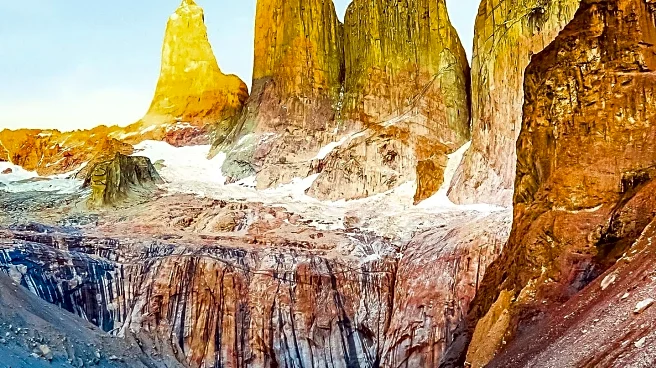What's Happening?
Patagonia, a vast region at the southern tip of South America, spans across Argentina and Chile, offering dramatic landscapes and unique cultural experiences. The region is characterized by its stony plateaus, thorny bushes, and the Patagonian Andes,
which stretch along the border between the two countries. Visitors can explore glaciers, lakes, and national parks such as Los Glaciares and Torres del Paine. The region is known for its strong winds, particularly during the summer months, due to its location in the 'roaring forties'. Culinary experiences include local dishes like Cordero al Palo, a spit-roasted lamb, and fresh seafood from Ushuaia. The region also offers opportunities to interact with locals, including gauchos and veterans from historical conflicts.
Why It's Important?
Patagonia's unique geographical and cultural offerings make it a significant destination for adventure travelers and those interested in exploring remote natural landscapes. The region's strong winds and vast wilderness present challenges and opportunities for outdoor activities such as hiking and trekking. The cultural interactions with locals provide insights into the history and lifestyle of the region, enhancing the travel experience. The culinary offerings highlight the blend of Argentine and Chilean influences, adding to the region's appeal as a travel destination.
What's Next?
Travelers planning to visit Patagonia should prepare for the strong winds and consider visiting during the shoulder seasons to avoid crowds. Exploring beyond popular tourist spots can offer more intimate experiences with the region's natural beauty. Engaging with local communities and trying regional cuisines can enrich the travel experience. As the region continues to attract visitors, sustainable tourism practices will be crucial to preserving its natural and cultural heritage.
Beyond the Headlines
Patagonia's remote location and challenging weather conditions highlight the importance of sustainable tourism practices to protect its natural landscapes and cultural heritage. The region's history of indigenous tribes and European explorers adds depth to its cultural narrative, offering travelers a chance to learn about its historical significance. The culinary traditions reflect the region's diverse influences, providing a unique gastronomic experience.















